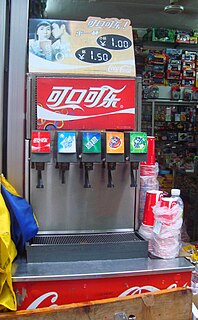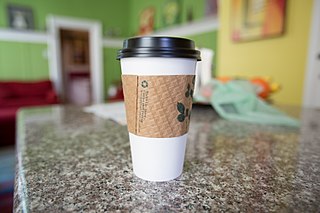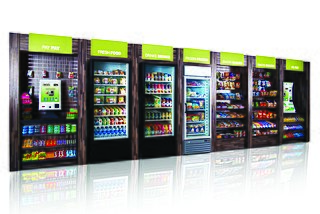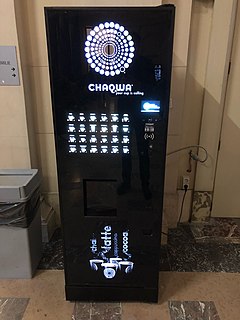
A soft drink is a drink that usually contains water, a sweetener, and a natural and/or artificial flavoring. The sweetener may be a sugar, high-fructose corn syrup, fruit juice, a sugar substitute, or some combination of these. Soft drinks may also contain caffeine, colorings, preservatives, and/or other ingredients.

A vending machine is an automated machine that provides items such as snacks, beverages, cigarettes and lottery tickets to consumers after cash, a credit card, or a specially designed card is inserted into the machine. The first modern vending machines were developed in England in the early 1880s and dispensed postcards. Vending machines exist in many countries and, in more recent times, specialized vending machines that provide less common products compared to traditional vending machine items have been created.
Georgia is the name of a popular brand of coffee drinks sold by The Coca-Cola Company. The brand is named after Coca-Cola's home state of Georgia. It was launched in 1975 by Coca-Cola (Japan) Company, a Japanese subsidiary of the company. It has since expanded to markets in Singapore, South Korea, India, Bahrain, and the United States of America. Georgia enjoys the most success in Japan, where it is the highest-grossing coffee beverage. It is also the highest-grossing beverage by Coca-Cola (Japan) Company. As of 2007, in Japan, Georgia's sales double the sales of Coca-Cola. Georgia is one of many brands of Japanese canned coffee. Georgia coffee was introduced in the United States in 2009, where it is almost exclusively sold in Asian grocery stores. The brand was introduced in 1975.

A soda fountain is a device that dispenses carbonated soft drinks, called fountain drinks. They can be found in restaurants, concession stands and other locations such as convenience stores. The device combines flavored syrup or syrup concentrate and carbon dioxide with chilled and purified water to make soft drinks, either manually, or in a vending machine which is essentially an automated soda fountain that is operated using a soda gun. Today, the syrup often is pumped from a special container called a bag-in-box (BiB).

Coca-Cola Amatil Limited (CCA) is one of the largest bottlers of non-alcoholic ready-to-drink beverages in the Asia-Pacific region and one of the world's five major Coca-Cola bottlers. CCA operates in six countries – Australia, New Zealand, Indonesia, Papua New Guinea, Fiji and Samoa. The company also bottles beer and coffee.

PepsiCo, Inc. is an American multinational food, snack, and beverage corporation headquartered in Harrison, New York, in the hamlet of Purchase. PepsiCo has interests in the manufacturing, marketing, and distribution of grain-based snack foods, beverages, and other products. PepsiCo was formed in 1965 with the merger of the Pepsi-Cola Company and Frito-Lay, Inc. PepsiCo has since expanded from its namesake product Pepsi to a broader range of food and beverage brands, the largest of which included an acquisition of Tropicana Products in 1998 and the Quaker Oats Company in 2001, which added the Gatorade brand to its portfolio.

A reverse vending machine is a device that accepts used (empty) beverage containers and returns money to the user. The machines are popular in places that have mandatory recycling laws or container deposit legislation. In some places, bottlers paid funds into a centralized pool to be disbursed to people who recycled the containers. Any excess funds were to be used for general environmental cleanup. In other places, such as Norway, the state mandated that a vendor pay for recycled bottles, but left the system in the hands of private industry.

Dixie-Narco was a former brand of soda vending machines located in Williston, South Carolina owned by Crane Merchandising Systems.

Nestea is a Swiss brand of iced tea and pop beverages owned by Nestlé, manufactured by The Coca-Cola Company and distributed by Nestlé's beverage department in the United States and by Beverage Partners Worldwide (BPW), a joint venture between The Coca-Cola Company and Nestlé, in the rest of the world. It competes with Unilever/PepsiCo's Lipton Iced Tea and Fuze Tea. Nestea provides a variety of tea products, including liquid and powdered tea concentrates, refrigeratable teas, and ready-to-drink bottles dispensed by vendor or vending machine. The beverage comes in several flavors, depending on the country.
Bulk vending is the sale of unsorted confections, nuts, gumballs, toys and novelties selected at random and dispensed generally through non-electrically operated vending machines. Bulk vending is a separate segment of the vending industry from full-line vending — i.e., the snack and soda vending industries — and involves different products and strategies. Bulk vending represents less than 1% of the total vending industry.

Crane Co. is an American industrial products company based in Stamford, Connecticut. Founded by Richard Teller Crane in 1855, it became one of the leading manufacturers of bathroom fixtures in the United States, until 1990, when that division was sold off. In 1960 it began the process of becoming a holding company with a diverse portfolio. Its business segments are Aerospace & Electronics, Engineered Materials, Payment and Merchandising Technology, Fluid Handling, and Controls. Industries served by these segments include chemical industries, commercial construction, food and beverage, general and commercial aviation, and power generation.

J&J Snack Foods Corporation (JJSF) is an American manufacturer, marketer, and distributor of branded niche snack foods and frozen beverages for the food service and retail supermarket industries. Headquartered in Pennsauken, NJ, JJSF uses over 175 facilities for manufacturing, warehousing, and distributing located in 44 states, Mexico, and Canada. The company is listed on the NASDAQ Global Select Market as “JJSF”, and serves both national and international markets.
Keurig is a beverage brewing system for home and commercial use. The machines are manufactured by the American company Keurig Dr Pepper. The main Keurig products are: K-Cup pods, which are single-serve coffee containers; other beverage pods; and the proprietary machines that brew the beverages in these pods.
The Mills Novelty Company, Incorporated of Chicago was once a leading manufacturer of coin-operated machines, including slot machines, vending machines, and jukeboxes, in the United States. Between about 1905 and 1930, the company's products included the Mills Violano-Virtuoso and its predecessors, celebrated machines that automatically played a violin and, after about 1909, a piano. By 1944, the name of the company had changed to Mills Industries, Incorporated. The slot machine division was then owned by Bell-O-Matic Corporation. By the late 1930s, vending machines were being installed by Mills Automatic Merchandising Corporation of New York.

Coffee cup sleeves, also known as coffee sleeves, coffee clutches, coffee cozies, hot cup jackets, paper zarfs, coffee collars, coffee sleeve, and cup holders, are roughly cylindrical sleeves that fit tightly over handle-less paper coffee cups to insulate the drinker's hands from hot coffee. Coffee sleeves are typically made of textured paperboard, but can be found made of other materials. Coffee sleeves allow coffee houses, fast food restaurants, and other vendors to avoid double-cupping, the practice of using two nested paper cups for a single hot beverage. Some paper cup holders carry advertisements.

Micro Markets are a retail sector, closely tied to the vending machine industry, that utilizes automated self-checkout technology to operate in locations that require unattended payment capability. Grab-and-go Micro Markets are unattended retail environments where consumers can purchase products from open shelves, coolers, or freezers. Consumers use a self-checkout kiosk to purchase their products, or advanced AI technology that is leveraged to facilitate a seamless experience, as with Amazon Go. They are a hybrid form of vending, foodservice, coffee service, and convenience stores that provide an improved customer experience, exponentially greater product variety, and increased sales within a single location, while keeping labor costs down and increasing operational efficiencies. Given the market sector in which Micro Markets exist, the National Automatic Merchandising Association (NAMA) “recognize[s] [Micro Markets] as one of its focus channels along with vending, foodservice and refreshment services". The COVID-19 pandemic is expected to drive innovation in the self-checkout model as vendors are looking for ways to provide safe, touchless, and easy-to-use self-checkout solutions to protect both employees and customers.
Crane Merchandising Systems is a designer and manufacturer of vending machines. Their manufacturing facility is located in Williston, South Carolina, United States.

Café+co International Holding (café+co) is an international operating corporate group with its headquarters in Vienna. The company markets its beverage dispensers for hot and cold drinks and its self-service vending machines for snacks and sweets in Austria as well as in middle and east Europe.
Sanden Corporation is a Japanese, Isesaki, Gunma-based automotive equipment and electrical equipment manufacturing company and is listed on the Tokyo Stock Exchange.

The coffee vending machine is a vending machine that dispenses hot coffee and other coffee beverages. Older models used instant coffee or concentrated liquid coffee and hot or boiling water, and provided condiments such as cream and sugar. Some modern machines prepare various coffee styles such as mochas and lattes and use ground drip coffee, and some fresh-grind the coffee to order using a grinder in the machine.















